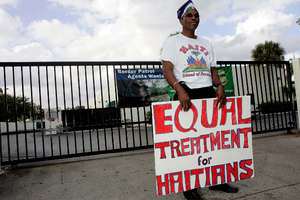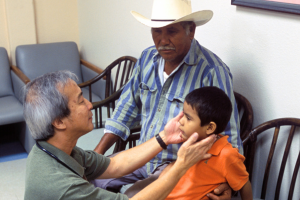THE TORCH: CONTENTS By Chiraayu Gosrani
February 1, 2023
Crises around the world—including in Ukraine and Haiti—have sparked increased flows of migrants seeking safety in the United States. While the Biden administration has welcomed Ukrainian refugees with open arms, senior officials are hastily preparing to send Haitian asylum seekers to Guantanamo—a site notoriously associated with war crimes and torture in the post-9/11 era and one historically associated with U.S. cruelty towards Haitians. Designed to evade international human rights law, this outrageous proposal harkens back to the 1990s, when Guantanamo was used as a makeshift prison camp where thousands of Haitians were detained in deplorable conditions and hundreds with H.I.V. were held indefinitely. The latest chapter in a long history of anti-Black racism in U.S. immigration policy and U.S. imperialism toward Haiti, the Biden administration’s Guantanamo proposal represents more of the same cruelty that has defined U.S. mistreatment of Haitians for decades.
The humanitarian crisis in Haiti is dire. Following the assassination of President Jovenel Moise in 2021, Haitians have experienced prolonged political crises and escalating violence. This instability has resulted in catastrophic food and water shortages, a significant cholera outbreak, and fuel scarcity that has shut down the economy and forced many health care centers to close. Armed groups have become de facto authorities in large parts of the Haitian capital, Port-au-Prince. Civilians are being threatened, sexually assaulted, kidnapped, and killed. These conditions have forced Haitians to flee, often resorting to treacherous, fatal routes by boat or by foot through thousands of miles of jungles, rivers, and deserts to the U.S.- Mexico border.

Joe Raedle
Citing the deteriorating conditions in Haiti and spurred by mounting criticism from advocates, the Biden administration announced on December 5, 2022, the extension and redesignation of Temporary Protected Status (TPS) for Haiti. The TPS program temporarily protects Haitians in the U.S. from deportation and allows Haitian immigrants to continue living and working in the U.S. The redesignation allows Haitians who arrived in the United States before November 6, 2022, to apply for the program, whereas previously only those who had arrived before July 29, 2021, were eligible. The administration also pushed back the expiration date from February 4, 2023, to August 3, 2024. Additionally, in January, President Biden announced a new plan to offer humanitarian parole to up to 30,000 Haitian, Cuban, Nicaraguan, and Venezuelan migrants per month. The administration touted these policies as part of “immediate steps to provide safe, orderly, humane pathways” for migration.
But the administration is simultaneously doubling down on detention and deportation to punish, rather than protect, Haitians seeking safety. Indeed, the TPS announcement came with an explicit warning that Haitians who make the journey to the U.S. in the coming months will be turned away and returned to danger, and the parole program announcement called for an expansion of expulsions at the border under Title 42—a public health measure that has been co-opted to strip migrants of the right to asylum and return them to perilous conditions in Mexico without due process. In addition, the parole program is prohibitive to most people fleeing Haiti in desperation. It requires applicants to have a U.S.-based fiscal sponsor, a passport, and a smart phone. Asylum seekers who migrate outside of the parole process are presumed to be ineligible for asylum. This asylum ban flouts international and U.S. law which requires migrants be given a fair opportunity to seek asylum.
The administration is already acting upon this threat: it has mobilized the U.S. Coast Guard to intercept more Haitian migrants at sea and deport them back to Haiti, where they face indefinite detention in Haiti’s National Penitentiary. The administration is also weighing plans to open new U.S. government-run detention sites in the Bahamas or Turks and Caicos, or to expand capacity at the prison camp center at Guantanamo Bay.
The present humanitarian crisis in Haiti, as well as the administration’s punitive proposals, are products of the same history of militarism and violence toward Haiti and its people.
U.S. policies dating back to Haitian independence are largely responsible for the current state of poverty and political instability in Haiti. Following the Haitian Revolution, an uprising of self-liberated African people, the U.S. refused to diplomatically recognize the free Black nation on the wishes of southern, white plantation owners. This ensured that France could force Haiti to pay for the “property” it lost as a result of independence — that is, the value of enslaved people and their labor. Haiti was forced to pay down that debt for centuries, mostly to U.S. creditors.
The U.S. began exerting its own imperial might over Haiti at the turn of the 20th century. In 1915, the U.S. invaded Haiti and occupied it for nineteen years. During the occupation, the U.S. forced a restructuring of the Haitian economy in favor of U.S. business interests. Even after its occupation ended in 1934, the U.S. continued to intervene in Haiti by propping up the repressive dictatorships of Francois “Papa Doc” Duvalier and his son Jean-Claude “Baby Doc” Duvalier. During the Duvaliers’ reign of terror from 1957 to 1986, approximately 200,000 Haitians were forced to flee the country and migrate to the U.S.
The U.S. government’s response to the plight of Haitians fleeing the Duvalier regime was openly discriminatory while Cubans arriving by boat were accepted and processed for entry, Haitian ‘boat people’ were regularly detained and sent back to their home country to face persecution, torture, and death. The Reagan administration continued the disparate treatment of Haitians by wrongly classifying Haitian asylum seekers as “economic migrants,” thus making it nearly impossible for them to secure humanitarian protections. The Reagan administration simultaneously introduced policies that required the detention of all Haitian migrants without the possibility of release while their immigration cases were pending. To fend off mounting accusations of discrimination, the government eventually applied the mandatory detention policy to all immigrants, not just Haitians, and thus laid the groundwork for the largest immigration detention system in the world — one currently responsible for detaining over 50,000 people daily. This system, rooted in white supremacy and built to criminalize immigrants, disproportionately harms, buses, and vilifies Black immigrants.
The Biden administration’s current Guantanamo proposal draws upon and perpetuates the legacy of anti-Black racism in U.S. policy toward Haiti. This reality becomes even clearer when comparing the disparate treatment of Ukrainian refugees fleeing the conflict with Russia and Haitians fleeing crises of similar proportions. While extending safe pathways to migration for Ukrainians, such as through the United for Ukraine parole program and the high volume of Title 42 exemptions granted to Ukrainians at the U.S.-Mexico border, the administration has practically shut the door on Haitians. In late 2021, just as the government prepared to welcome up to 100,000 Ukrainian refugees, heavily armed border agents on horseback with whips met Haitians in Del Rio, Texas.
Dozens of civil society organizations, led by the Haitian Bridge Alliance and including the National Immigration Law Center, have urged the administration to immediately reject plans to hold Haitian asylum seekers at Guantanamo or other offshore detention sites. To uphold its commitment to fostering racial equity and a humane immigration system, the administration must chart a new course that provides permanent protections for Haitians living in the United States and creates meaningful and safe pathways to protection for Haitian migrants fleeing their homes, without doubling down on detention and punishment. Only then can the administration begin to remedy the legacy of anti-Black racism that has pervaded U.S. mistreatment of Haitians for more than a century.
Chiraayu Gosrani is a Legal Fellow and member of the Racial Justice Initiative (RJI) at NILC.
















